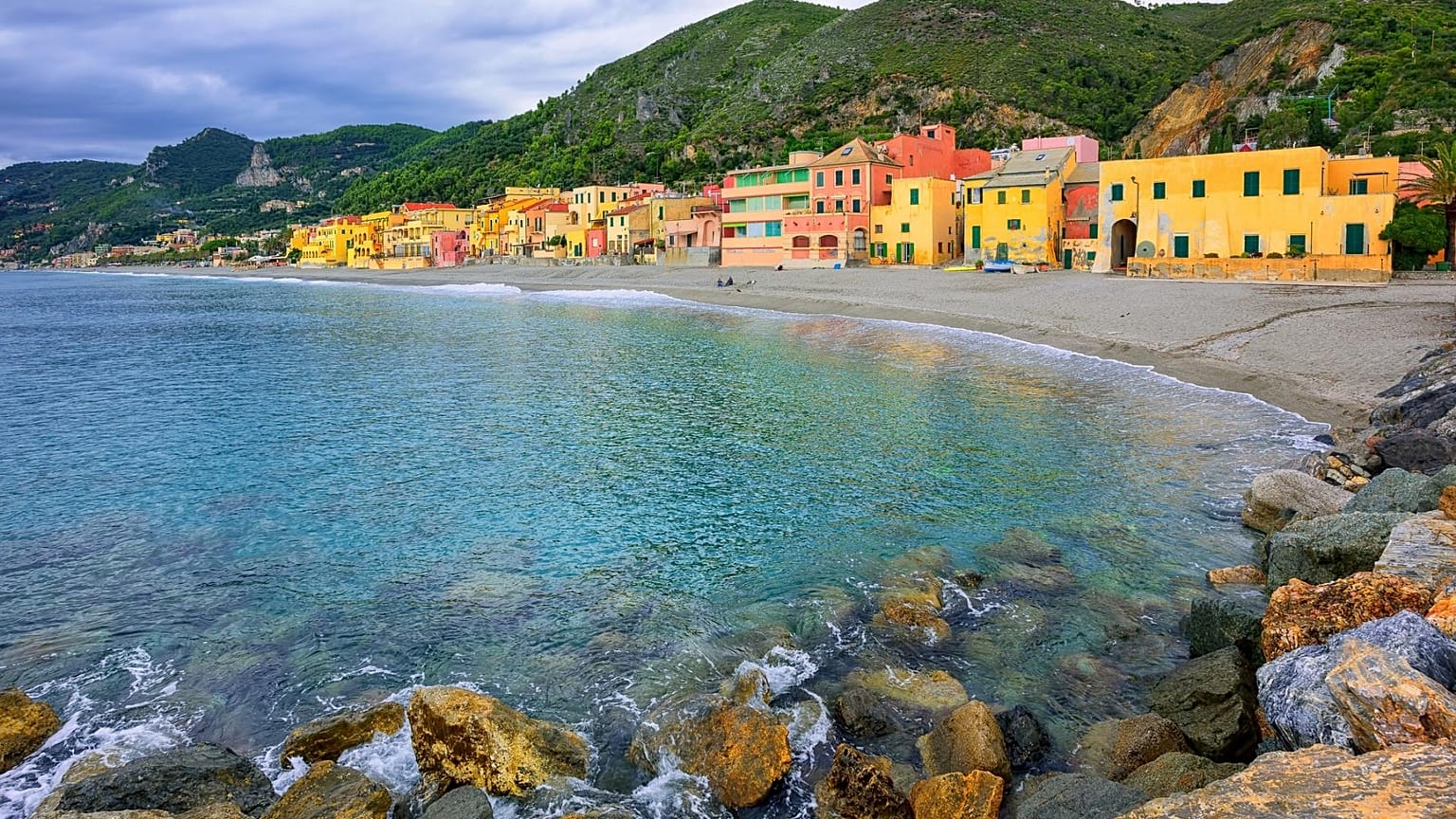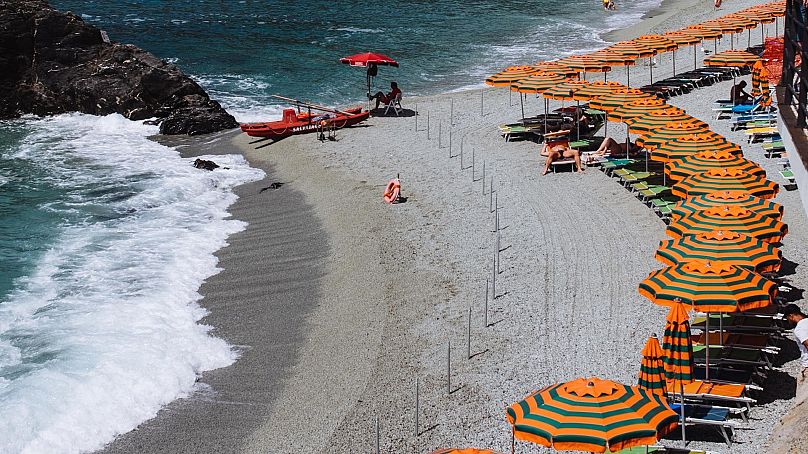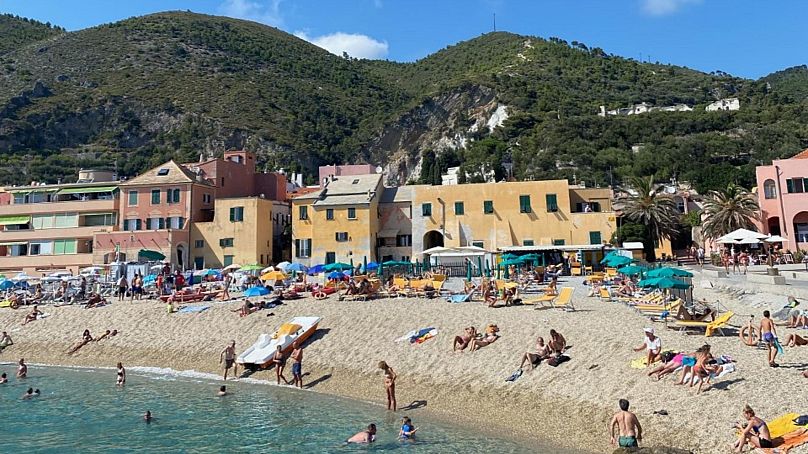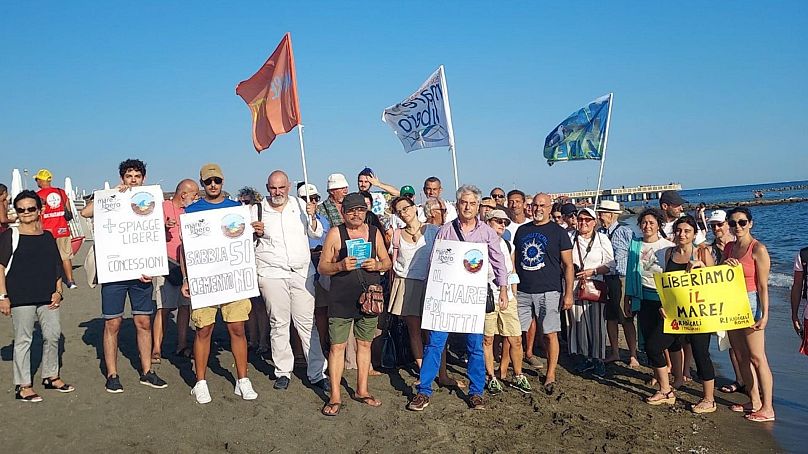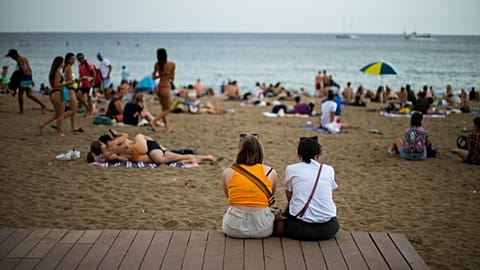Beach club owners, politicians and environmental campaigners are fighting over the future of Italy’s coastline.
Every summer, millions of Italians flock to the beaches lining the peninsula’s coastline, and the thousands of privately-run bathing clubs that are a fixture of holidays here. Yet, these ‘lidos’, or beach clubs, are keeping both Rome’s parliamentarians and its environmental activists particularly busy, as a fresh controversy erupts over government reforms to open up concessions on Italy’s seashores.
 ADVERTISEMENT
ADVERTISEMENT
 ADVERTISEMENT
ADVERTISEMENT
After years of pressure from the EU, Italy’s multi-party coalition government has agreed to put Italy’s private beaches out to tender by January 2024, with the reform having passed through the Senate this May.
This means that there will be public competitions to rent out these lucrative beach spots, as well as other shorelines across the country’s lakes and river banks.
As details of the decree are yet to be voted on by the Lower House and are still up in the air, following prime minister Mario Draghi’s resignation and the government’s collapse, Italy’s bathing clubs fear that such a shake-up would threaten the privileges they have enjoyed for decades.
In a new “beach war” that could be described as a conflict on multiple fronts, Rome now finds itself fending off a disgruntled lido lobby and outspoken environmental campaigners in a messy fight over the future of Italy’s coastline.
‘We want our work to be recognised’: Italy’s bathing clubs cling on to their beaches
Bathing establishments, or ‘stabilimenti balneari’, are a long-standing tradition in Italy. Largely family-controlled and passed down from one generation to the next, their rows of chairs, umbrellas and brightly-coloured wooden huts have become an unmistakable feature of the Italian coastline. For some they’re a symbol of the country’s post-war economic revival and synonymous with ‘la dolce vita.’
But the sweet life also comes with a saltier price - access to bathing club facilities averages €20-30 a day, and can be as high as €150 for more exclusive establishments.
Consequently, such seaside lidos have been routinely pilloried for becoming increasingly unaffordable for the average Italian family and for exerting a chokehold-like grip on the country’s coastline. They take up almost half of its beaches and remove any chance of competition. Even finding a lounger and umbrella to rent within the establishments themselves can be a challenge, as entire rows are often reserved for regulars.
Beach club licensing reforms could liberalise the market
But things could be about to change. As part of Italy’s post-COVID recovery plan, the government agreed to reforms which would force bathing establishments to re-apply for their licences. This is off the back of the EU Bolkenstein directive’s objective for market liberalisation. Until now, Italy has allowed beach clubs’ licences to be renewed automatically, a practice which has strained relationships between Rome and Brussels.
While such a system has been accused of fostering nepotism and an inaccessible market, it has also ensured that some of Italy’s 12,166 lidos are almost as old as the country’s constitution, and have become part and parcel of community life in seaside resorts.
Local beach club owners are apprehensive about the changes
In Varigotti - a picturesque fishing village on the Italian Riviera where the coastline is full of lidos - Euronews Travel spoke to one family-owned business that is apprehensive about the reforms.
Opened in 1964, Bagni La Giara is a bona fide local institution. Its customers have been holidaying here for decades, and it has become a magnet for Milan and Turin’s affluent middle classes fleeing the city’s smouldering summer heat. They pay the daily price of up to €60 for a coveted front-row position and private changing hut.
Bagni La Giara’s manager Filippo Magliola started running the business in 2008, after his wife inherited it from her grandfather. While he agrees the beach concessions system needs a shake-up, he says the current reforms debate is creating further anxiety in an already fragile economy.
“We are all worried about how this bidding will go ahead,” Magliola confessed. “There’s the risk that multinationals or unethical business owners will want to grab beach territory, thus resulting in a depersonalised beachfront.”
Magliola pointed to energy drink conglomerate Red Bull’s recent acquisition of a port and island near the northeastern Italian city of Trieste as an example of the future that could lie ahead for seaside resorts throughout the country.
“Varigotti is an alluring territory… it wouldn’t be surprising if businesses wanted to get their hands on it.”
Some say reforms will threaten tourism and livelihoods
Over at the nearby Bagni Valentino - which celebrates its 70th anniversary this year - the family patriarch, Sebastiano Gambetta, also commented on the reform plans, while being somewhat less fearful about the future.
“At Bagni Valentino, we don’t see the reforms as dramatic,” he noted. “But some of our clients have been coming to our beach club for generations. Most of the other establishment owners in the area see this reform as a threat.”
Such fears are shared with members of the country’s outspoken bathing establishment associations, who worry that the reform will wreak havoc on Italy’s tourist industry, jeopardise the livelihoods of thousands, and result in unfair competition, with bigger companies seeking to make a land grab of lucrative beach space.
Conservative politicians rush to defend Italy’s seaside business class
Within the halls of Rome’s parliament chambers, such concerns have found a sympathetic ear among the far-right, whose protectionist politics align with the desire to preserve the interests of Italy’s seaside business class.
“[We] will keep fighting for bathing establishments, because we are facing an evident injustice,” Brothers of Italy Senator, Antonio Iannone, declared. “The expropriation of Italian work represents an intolerable activity of the Italian government.”
The politician derided what he considered to be unfair media coverage of such bathing clubs and their owners, who have been portrayed as parasites exploiting the system and charging extortionate fees.
“This [media] campaign has evidently been funded by the same strong powers that want to get their hands on [these] 30,000 businesses that aren’t just numbers, but real people and values,” he said.
The party to which Iannone belongs - Italy’s most popular conservative party - recently tabled an amendment in the Senate which asked to exclude beach clubs from the new EU-imposed reforms. It was voted down on 29 June.
But as details of the economic competition bill are still set to be discussed and the government’s own fate is uncertain, the future of Italy’s beach clubs hangs in the balance.
“The situation is confusing… no one knows how these bids will go ahead,” Magliola added. “We’ve put time and money into our businesses, we want this to be respected.”
“Our coastline is not a commodity”: environmental activists clap back
Another side of the beach controversy is represented by environmental organisations. They are critical of both EU-imposed government reforms and bathing establishments’ grip.
Such campaigners’ efforts took a disturbing turn this June after six activists belonging to one organisation, Mare Libero meaning ‘free sea’, ended up in a heated exchange with the owners of a beach club in Rome’s seaside suburb Ostia. They were asked to pay to merely walk through the establishment’s premises and in the altercation that followed one member was shoved to the ground, and the police and an ambulance were summoned.
Founded in 2019, Mare Libero campaigns for free access to beaches and rallies against what its members consider to be a creeping commercialisation of the country’s coastline.
“We see beaches as a place where profit should not be involved,” Agostino Biondo, the group’s secretary, told Euronews Travel. “If we keep treating our beaches like a commodity, alongside having disproportionately priced and environmentally damaging services, there’s a risk [for the shoreline].”
Biondo cited Barcelona’s seafront as a reference for the kind of public beach model he wanted for urban areas. In places like his native Rome, bathing establishments occupy a significant chunk of the coast, making it difficult for individuals to find a free space in which to enjoy the sunshine. In some resorts, like Gatteo a Mare in the northeastern Italian region of Emilia-Romagna, the coastline is entirely occupied by beach clubs, with no ‘free beaches’ (spiagge libere) available.
While Biondo welcomed some aspects of the beach concessions reform, such as shaking up a stagnant system, he still noted certain “critical issues” with the decree, namely in how it sidelines the participation and concerns of environmental organisations.
“More than anything else, this [government] reform was imposed by Europe,” Biondo expressed. “The Italian political system doesn’t realise that a radical reform of Italy’s beach management could transform the coastline, rendering much of it a true gem in a country that thrives on tourism.”
Biondo’s group has no qualms in taking its concerns to the streets - or rather, the beaches. On 14 July, Mare Libero organised a set of demonstrations in 11 seaside towns across Italy to voice their criticisms of the current situation.
“We want free access to the sea for everyone,” Rome’s chapter president Danilo Ruggiero told us in Ostia. “You’d have to walk 600-700m just to find a public beach.” As he speaks, a group of tourists are sighted getting changed by a bench on the town’s pier, which Ruggiero enthusiastically cites as an illustration of the lack of free beach space.
In a resort like Ostia, bathing establishments are nothing short of mini-concrete fortresses, replete with restaurants and swimming pools, an imposing presence on the shoreline. Given the protest’s date, a playfully ironic allusion to the storming of the Bastille is hard to avoid.
“Concessions [shouldn’t] get passed down from one generation to the next,” Ruggiero yelled from his megaphone, standing a mere few yards from a beach club. “No to patrons for life!”














